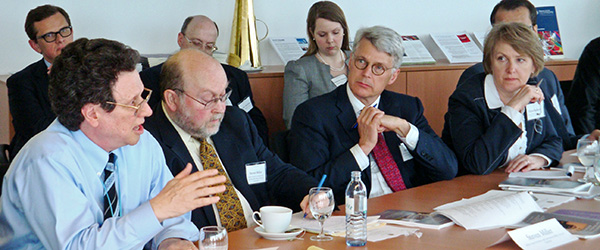

The CIF program, organized by the James Martin Center for Nonproliferation Studies (CNS) since 1998, has for the first time held its annual conference in Vienna. This year's participants include students and teachers from the U.S., Russia, and, for the first time, Austria and Bosnia & Herzogovina. The theme for the 2012 session was nuclear safety and security issues. Students presented their research and had an opportunity to meet with leading experts in the nuclear nonproliferation field, as well as numerous MIIS alumni and students involved in the NPT PrepCom or working at nonproliferation organizations in Vienna. This year's CIF conference was co-organized by CNS, VCDNP, and the Austrian Ministry of Foreign Affairs.
The first day of the program was held at the Vienna International Center during the first day of the First Preparatory Committee of the 2015 NPT Review Conference. Participants were greeted by the IAEA Director General Yukiya Amano,Ambassador Toshiro Ozawa, Permanent Representative of Japan to the International Organizations in Vienna, and Minister Ronald Sturm, Head of Unit at the Austrian Ministry for European and International Affairs. Participants also met withMasahito Hirose, a survivor of the nuclear explosion in Nagasaki, Japan. In the course of the day, students had an opportunity to present their final projects to an international audience, observe deliberations at the NPT Preparatory Committee, and visit monitoring and data centers of the Preparatory Committee for the Comprehensive Test Ban Treaty Organization.
This event was organized in cooperation with the International Panel on Fissile Materials (IPFM) and Princeton University. It reviewed the state of international contacts and negotiations with regard to the Iranian program as well as national and regional perspectives on possible approaches to finding a resolution on the issue. Panelists also discussed possible diplomatic and technical solutions in the run-up to the forthcoming "P5+1" meeting.
Speakers included:


The VCDNP co-organized and hosted a meeting of the Global Nuclear Future Initiative of the American Academy of Arts and Sciences, which focused on the discussion of two recent reports: one by Steven Miller ("Nuclear Collisions: Discord, Reform & the Nuclear Nonproliferation Regime") and another by Stephen M. Goldberg, Robert Rosner, and James P. Malone ("The Back-End of the Nuclear Fuel Cycle: An Innovative Storage Concept.") Participants discussed an array of political and technical solutions to the challenges facing the nuclear nonproliferation regime.
Speakers included:

The event was organized in cooperation with the PIR Center (The Russian Center for Policy Studies), Centre Russe d'Etudes Politiques, and the Austrian Ministry of Foreign Affairs. The first part of the panel discussion ("ideas from Russia") reviewed Russia's approaches to nuclear arms reduction and disarmament in the light of the Action Plan adopted at the 2010 NPT Review Conference. The second part ("ideas for Russia") discussed prospects of international cooperation in nuclear disarmament and specific measures that could be adopted by the United States and Russia as well as the international community as a whole.
Speakers included:

Discussion with Facilitator of the 2012 Conference, Ambassador Jaakko Laajava, Undersecretary of State, Ministry of Foreign Affairs of Finland, and Dr. William Potter, Director, James Martin Center for Nonproliferation Studies.
One of the key results of the 2010 Non-Proliferation Treaty Review Conference (NPT RevCon) was a decision by the state parties to the Treaty to convene a conference in 2012 on the establishment of a Middle East zone free of nuclear weapons and all other weapons of mass destruction. In October 2011, an agreement was reached on Finland to host the conference and Ambassador Jaakko Laajava to act as the facilitator. Amb. Laajava reviewed international efforts that have been undertaken for the implementation of the 2010 NPT Review Conference decisions with regard to the establishment of a WMD-free zone in the Middle East as well as the prospects of the conference scheduled to be convened in 2012. He noted that he had held over 100 meetings with states in the region, co-sponsors of the 1995 Middle East Resolution, other states, international organizations, and civil society. He further noted a number of challenges facing the future conference and the efforts to resolve them. Amb. Laajava answered multiple questions coming from the audience, with priority given to questions coming from representatives of nongovernmental organizations attending the PrepCom.
